formerly eScholarship Editions


|
|
|
|
Your search for
'Sociology' in subject
found 305 book(s). | Modify Search | Displaying 61 - 80 of 305 book(s) | |
| 61. | 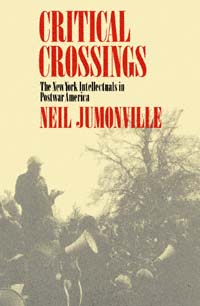 | Title: Critical crossings: the New York intellectuals in postwar America Author: Jumonville, Neil Published: University of California Press, 1990 Subjects: History | Autobiographies and Biographies | Sociology | Politics | American Studies Publisher's Description: The period immediately following the Second World War was a time, observed Randall Jarrell, when many American writers looked to the art of criticism as the representative act of the intellectual. Rethinking this interval in our culture, Neil Jumonville focuses on the group of writers and thinkers who founded, edited, and wrote for some of the most influential magazines in the country, including Partisan Review , Politics , Commentary , and Dissent . In their rejection of ideological, visionary, and romantic outlooks, reviewers and essayists such as Sidney Hook, Irving Howe, Lionel Trilling, Harold Rosenberg, and Daniel Bell adopted a pragmatic criticism that had a profound influence on the American intellectual community. By placing pragmatism at the center of intellectual activity, the New York Critics crossed from large belief systems to more tentative answers in the hope of redefining the proper function of the intellectual in the new postwar world.Because members of the New York group always valued being intellectuals more than being political leftists, they adopted a cultural elitism that opposed mass culture. Ready to combat any form of absolutist thought, they found themselves pitted against a series of antagonists, from the 1930s to the present, whom they considered insufficiently rational and analytical to be good intellectuals: the Communists and their sympathizers, the Beat writers, and the New Left. Jumonville tells the story of some of the paradoxes and dilemmas that confront all intellectuals. In this sense the book is as much about what it means to be an intellectual as it is about a specific group of thinkers. [brief] Similar Items |
| 62. | 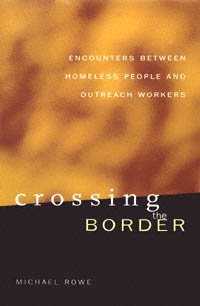 | Title: Crossing the border: encounters between homeless people and outreach workers Author: Rowe, Michael 1947- Published: University of California Press, 1999 Subjects: Sociology | Anthropology | Psychology | American Studies | Urban Studies | Social Problems | Anthropology Publisher's Description: The relationship between the homeless and the social service community marks a border where the disenfranchised meet the mainstream of society. Crossing the Border , the first book-length study of outreach work to the mentally ill homeless, uses ethnographic tools to examine encounters at this border. Michael Rowe provides a rich picture not only of a particular group of homeless people, but also of the complicated interactions between the marginalized and those who try to help them. As it examines both the dilemmas and opportunities of outreach work to the mentally ill homeless, this compelling study asks us to consider the broader questions about how we relate to the poor and other marginal persons at the border of society.The author's personal encounters with the homeless as Director of the New Haven ACCESS outreach project, his interviews with fifty homeless persons for this study, and his numerous interviews with outreach staff, provide an invaluable personal perspective. In this study, Rowe draws a collective portrait of the homeless whom he interviewed and observed, discusses the outreach workers in depth, examines transactions from the perspective of each party, and finally, places these encounters within the social and institutional contexts that shape them.Rowe's writing is accessible and punctuated with many vivid anecdotes. As Crossing the Border shows, encounters between the homeless and outreach workers represent a measure of where we will set our social boundaries and what standard of living we will accept for those who live at that boundary. [brief] Similar Items |
| 63. |  | Title: A culture of conspiracy: apocalyptic visions in contemporary America Author: Barkun, Michael Published: University of California Press, 2003 Subjects: Politics | Sociology | Christianity | Comparative Religions Publisher's Description: What do UFO believers, Christian millennialists, and right-wing conspiracy theorists have in common? According to Michael Barkun in this fascinating yet disturbing book, quite a lot. It is well known that some Americans are obsessed with conspiracies. The Kennedy assassination, the Oklahoma City bombing, and the 2001 terrorist attacks have all generated elaborate stories of hidden plots. What is far less known is the extent to which conspiracist worldviews have recently become linked in strange and unpredictable ways with other "fringe" notions such as a belief in UFOs, Nostradamus, and the Illuminati. Unraveling the extraordinary genealogies and permutations of these increasingly widespread ideas, Barkun shows how this web of urban legends has spread among subcultures on the Internet and through mass media, how a new style of conspiracy thinking has recently arisen, and how this phenomenon relates to larger changes in American culture. This book, written by a leading expert on the subject, is the most comprehensive and authoritative examination of contemporary American conspiracism to date. Barkun discusses a range of material - involving inner-earth caves, government black helicopters, alien abductions, secret New World Order cabals, and much more - that few realize exists in our culture. Looking closely at the manifestions of these ideas in a wide range of literature and source material from religious and political literature, to New Age and UFO publications, to popular culture phenomena such as The X-Files, and to websites, radio programs, and more, Barkun finds that America is in the throes of an unrivaled period of millennarian activity. His book underscores the importance of understanding why this phenomenon is now spreading into more mainstream segments of American culture. [brief] Similar Items |
| 64. | 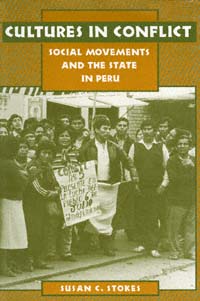 | Title: Cultures in conflict: social movements and the state in Peru Author: Stokes, Susan Carol Published: University of California Press, 1995 Subjects: Latin American Studies | Politics | Sociology | Anthropology | Urban Studies Publisher's Description: In this vivid ethnography set in contemporary Peru, Susan Stokes provides a compelling analysis of the making and unmaking of class consciousness among the urban poor. Her research strategy is multifaceted; through interviews, participant observation, and survey research she digs deeply into the popular culture of the social activists and shantytown residents she studies. The result is a penetrating look at how social movements evolve, how poor people construct independent political cultures, and how the ideological domination of oppressed classes can shatter.This work is a new and vital chapter in the growing literature on the formation of social movements. It chronicles the transformation of Peru's poor from a culture of deference and clientelism in the late 1960s to a population mobilized for radical political action today. [brief] Similar Items |
| 65. | 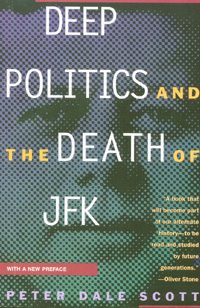 | Title: Deep politics and the death of JFK Author: Scott, Peter Dale Published: University of California Press, 1993 Subjects: History | Politics | Popular Culture | United States History | American Studies | Sociology Publisher's Description: Peter Dale Scott's meticulously documented investigation uncovers the secrets surrounding John F. Kennedy's assassination. Offering a wholly new perspective - that JFK's death was not just an isolated case, but rather a symptom of hidden processes - Scott examines the deep politics of early 1960s American international and domestic policies.Scott offers a disturbing analysis of the events surrounding Kennedy's death, and of the "structural defects" within the American government that allowed such a crime to occur and to go unpunished. In nuanced readings of both previously examined and newly available materials, he finds ample reason to doubt the prevailing interpretations of the assassination. He questions the lone assassin theory and the investigations undertaken by the House Committee on Assassinations, and unearths new connections between Oswald, Ruby, and corporate and law enforcement forces.Revisiting the controversy popularized in Oliver Stone's movie JFK, Scott probes the link between Kennedy's assassination and the escalation of the U.S. commitment in Vietnam that followed two days later. He contends that Kennedy's plans to withdraw troops from Vietnam - offensive to a powerful anti-Kennedy military and political coalition - were secretly annulled when Johnson came to power. The split between JFK and his Joint Chiefs of Staff, and the collaboration between Army Intelligence and the Dallas Police in 1963, are two of the several missing pieces Scott adds to the puzzle of who killed Kennedy and why.Scott presses for a new investigation of the Kennedy assassination, not as an external conspiracy but as a power shift within the subterranean world of American politics. Deep Politics and the Death of JFK shatters our notions of one of the central events of the twentieth century. [brief] Similar Items |
| 66. |  | Title: A democratic South Africa?: constitutional engineering in a divided society Author: Horowitz, Donald L Published: University of California Press, 1991 Subjects: Politics | African Studies | Sociology | Law Publisher's Description: Can a society as deeply divided as South Africa become democratic? In a most timely work, Donald L. Horowitz, author of the acclaimed Ethnic Groups in Conflict , points to the conditions that make democracy an improbable outcome in South Africa. At the same time, he identifies ways to overcome these obstacles, and he describes institutions that offer constitution makers the best chance for a democratic future.South Africa is generally considered an isolated case, a country unlike any other. Drawing on his extensive experience of racially and ethnically divided societies, however, Horowitz brings South Africa back into African and comparative politics. Experience gained in Nigeria, Botswana, Zimbabwe, and other divided societies around the world is relevant because, as South Africa leaves apartheid behind, it will still confront problems of pluralism: racial, ethnic, and ideological. Countries like South Africa, Horowitz argues, must develop institutions capable of coping with such divisions.Reviewing an array of constitutional proposals for South Africa - group rights, consociation, partition, binationalism, and an enhanced role for the judiciary - Horowitz shows that most are inappropriate for the country's problems, or else run afoul of some major ideological taboo. Institutions that are both apt and acceptable do exist, however. These are premised on the need to create incentives for accommodation across group lines. In the final chapter, Horowitz makes a major contribution to the theory of democratization as he considers how commitments to democracy might be extracted even from political groups with undemocratic objectives.Ranging skillfully across studies of social distance and stereotypes, electoral and party systems, constitutions and judiciaries, conflict and accommodation, and negotiation and democratization, Horowitz displays a broad comparative vision. His innovative study will change the way theorists and practitioners approach the task of making democracy work in difficult conditions. [brief] Similar Items |
| 67. |  | Title: Diasporas and exiles: varieties of Jewish identity Author: Wettstein, Howard Published: University of California Press, 2002 Subjects: Jewish Studies | European History | Social and Political Thought | Sociology | Immigration Publisher's Description: Diaspora, considered as a context for insights into Jewish identity, brings together a lively, interdisciplinary group of scholars in this innovative volume. Readers needn't expect, however, to find easy agreement on what those insights are. The concept "diaspora" itself has proved controversial; galut, the traditional Hebrew expression for the Jews' perennial condition, is better translated as "exile." The very distinction between diaspora and exile, although difficult to analyze, is important enough to form the basis of several essays in this fine collection. "Identity" is an even more elusive concept. The contributors to Diasporas and Exiles explore Jewish identity - or, more accurately, Jewish identities - from the mutually illuminating perspectives of anthropology, art history, comparative literature, cultural studies, German history, philosophy, political theory, and sociology. These contributors bring exciting new emphases to Jewish and cultural studies, as well as the emerging field of diaspora studies. Diasporas and Exiles mirrors the richness of experience and the attendant virtual impossibility of definition that constitute the challenge of understanding Jewish identity. [brief] Similar Items |
| 68. | 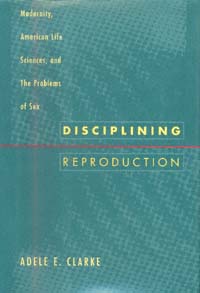 | Title: Disciplining reproduction: modernity, American life sciences, and "the problems of sex" Author: Clarke, Adele Published: University of California Press, 1998 Subjects: Sociology | Medical Anthropology | Medicine | American Studies | Gender Studies Publisher's Description: Reproductive issues from sex and contraception to abortion and cloning have been controversial for centuries, and scientists who attempted to turn the study of reproduction into a discipline faced an uphill struggle. Adele Clarke's engrossing story of the search for reproductive knowledge across the twentieth century is colorful and fraught with conflict.Modern scientific study of reproduction, human and animal, began in the United States in an overlapping triad of fields: biology, medicine, and agriculture. Clarke traces the complicated paths through which physiological approaches to reproduction led to endocrinological approaches, creating along the way new technoscientific products from contraceptives to hormone therapies to new modes of assisted conception - for both humans and animals. She focuses on the changing relations and often uneasy collaborations among scientists and the key social worlds most interested in their work - major philanthropists and a wide array of feminist and medical birth control and eugenics advocates - and recounts vividly how the reproductive sciences slowly acquired standing.By the 1960s, reproduction was disciplined, and the young and contested scientific enterprise proved remarkably successful at attracting private funding and support. But the controversies continue as women - the targeted consumers - create their own reproductive agendas around the world. Elucidating the deep cultural tensions that have permeated reproductive topics historically and in the present, Disciplining Reproduction gets to the heart of the twentieth century's drive to rationalize reproduction, human and nonhuman, in order to control life itself. [brief] Similar Items |
| 69. | 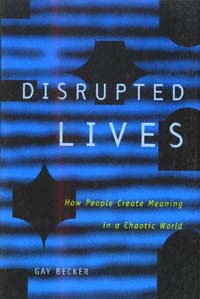 | Title: Disrupted lives: how people create meaning in a chaotic world Author: Becker, Gaylene Published: University of California Press, 1998 Subjects: Anthropology | Medicine | Sociology Publisher's Description: Our lives are full of disruptions, from the minor - a flat tire, an unexpected phone call - to the fateful - a diagnosis of infertility, an illness, the death of a loved one. In the first book to examine disruption in American life from a cultural rather than a psychological perspective, Gay Becker follows hundreds of people to find out what they do after something unexpected occurs. Starting with bodily distress, she shows how individuals recount experiences of disruption metaphorically, drawing on important cultural themes to help them reestablish order and continuity in their lives. Through vivid and poignant stories of people from different walks of life who experience different types of disruptions, Becker examines how people rework their ideas about themselves and their worlds, from the meaning of disruption to the meaning of life itself.Becker maintains that to understand disruption, we must also understand cultural definitions of normalcy. She questions what is normal for a family, for health, for womanhood and manhood, and for growing older. In the United States, where life is expected to be orderly and predictable, disruptions are particularly unsettling, she contends. And, while continuity in life is an illusion, it is an effective one because it organizes people's plans and expectations.Becker's phenomenological approach yields a rich, compelling, and entirely original narrative. Disrupted Lives acknowledges the central place of discontinuity in our existence at the same time as it breaks new ground in understanding the cultural dynamics that underpin life in the United States. FROM THE BOOK :"The doctor was blunt. He does not mince words. He did a [semen] analysis and he came back and said, 'This is devastatingly poor.' I didn't expect to hear that. It had never occurred to me. It was such a shock to my sense of self and to all these preconceptions of my manliness and virility and all of that. That was a very, very devastating moment and I was dumbfounded. . . . In that moment it totally changed the way that I thought of myself." [brief] Similar Items |
| 70. | 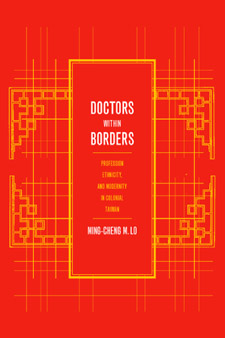 | Title: Doctors within borders: profession, ethnicity, and modernity in colonial Taiwan Author: Lo, Ming-cheng Miriam Published: University of California Press, 2002 Subjects: Asian Studies | Medical Anthropology | China | Asian History | Sociology Publisher's Description: This book explores Japan's "scientific colonialism" through a careful study of the changing roles of Taiwanese doctors under Japanese colonial rule. By integrating individual stories based on interviews and archival materials with discussions of political and social theories, Ming-cheng Lo unearths . . . [more] Similar Items |
| 71. | 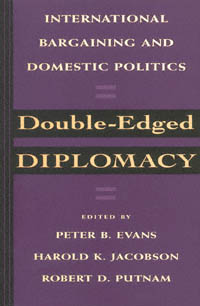 | Title: Double-edged diplomacy: international bargaining and domestic politics Author: Evans, Peter B 1944- Published: University of California Press, 1993 Subjects: Politics | Economics and Business | Public Policy | Sociology Publisher's Description: This original look at the dynamics of international relations untangles the vigorous interaction of domestic and international politics on subjects as diverse as nuclear disarmament, human rights, and trade. An eminent group of political scientists demonstrates how international bargaining that reflects domestic political agendas can be undone when it ignores the influence of domestic constituencies.The eleven studies in Double-Edged Diplomacy provide a major step in furthering a more complete understanding of how politics between nations affects politics within nations and vice versa. The result is a striking new paradigm for comprehending world events at a time when the global and the domestic are becoming ever more linked. [brief] Similar Items |
| 72. | 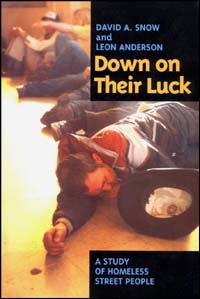 | Title: Down on their luck: a study of homeless street people Author: Snow, David A Published: University of California Press, 1993 Subjects: Sociology | Urban Studies | Politics | Ethnic Studies | Anthropology Similar Items |
| 73. | 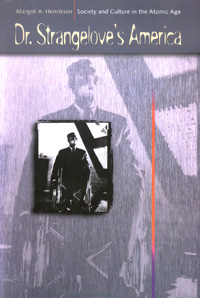 | Title: Dr. Strangelove's America: society and culture in the atomic age Author: Henriksen, Margot A Published: University of California Press, 1997 Subjects: History | United States History | Cultural Anthropology | Sociology Publisher's Description: Did America really learn to "stop worrying and love the bomb," as the title of Stanley Kubrick's 1964 film, Dr. Strangelove , would have us believe? Does that darkly satirical comedy have anything in common with Martin Luther King Jr.'s impassioned "I Have a Dream" speech or with Elvis Presley's throbbing "I'm All Shook Up"? In Margot Henriksen's vivid depiction of the decades after World War II, all three are expressions of a cultural revolution directly related to the atomic bomb. Although many scientists and other Americans protested the pursuit of nuclear superiority after World War II ended, they were drowned out by Cold War rhetoric that encouraged a "culture of consensus." Nonetheless, Henriksen says, a "culture of dissent" arose, and she traces this rebellion through all forms of popular culture.At first, artists expressed their anger, anxiety, and despair in familiar terms that addressed nuclear reality only indirectly. But Henriksen focuses primarily on new modes of expression that emerged, discussing the disturbing themes of film noir (with extended attention to Alfred Hitchcock) and science fiction films, Beat poetry, rock 'n' roll, and Pop Art. Black humor became a primary weapon in the cultural revolution while literature, movies, and music gave free rein to every possible expression of the generation gap. Cultural upheavals from "flower power" to the civil rights movement accentuated the failure of old values.Filled with fascinating examples of cultural responses to the Atomic Age, Henriksen's book is a must-read for anyone interested in the United States at mid-twentieth century. [brief] Similar Items |
| 74. |  | Title: Drug war politics: the price of denial Author: Bertram, Eva Published: University of California Press, 1996 Subjects: Politics | Public Policy | Law | Sociology | Medicine | American Studies Publisher's Description: Why have our drug wars failed and how might we turn things around? Ask the authors of this hardhitting exposè of U.S. efforts to fight drug trafficking and abuse. In a bold analysis of a century's worth of policy failure, Drug War Politics turns on its head many familiar bromides about drug politics. It demonstrates how, instead of learning from our failures, we duplicate and reinforce them in the same flawed policies. The authors examine the "politics of denial" that has led to this catastrophic predicament and propose a basis for a realistic and desperately needed solution.Domestic and foreign drug wars have consistently fallen short because they are based on a flawed model of force and punishment, the authors show. The failure of these misguided solutions has led to harsher get-tough policies, debilitating cycles of more force and punishment, and a drug problem that continues to escalate. On the foreign policy front, billions of dollars have been wasted, corruption has mushroomed, and human rights undermined in Latin America and across the globe. Yet cheap drugs still flow abundantly across our borders. At home, more money than ever is spent on law enforcement, and an unprecedented number of people - disproportionately minorities - are incarcerated. But drug abuse and addiction persist.The authors outline the political struggles that help create and sustain the current punitive approach. They probe the workings of Washington politics, demonstrating how presidential and congressional "out-toughing" tactics create a logic of escalation while the criticisms and alternatives of reformers are sidelined or silenced. Critical of both the punitive model and the legalization approach, Drug War Politics calls for a bold new public health approach, one that frames the drug problem as a public health - not a criminal - concern. The authors argue that only by situating drug issues in the context of our fundamental institutions - the family, neighborhoods, and schools - can we hope to provide viable treatment, prevention, and law enforcement. In its comprehensive investigation of our long, futile battle with drugs and its original argument for fundamental change, this book is essential for every concerned citizen. [brief] Similar Items |
| 75. | 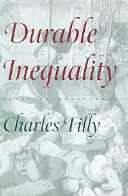 | Title: Durable inequality Author: Tilly, Charles Published: University of California Press, 1998 Subjects: Sociology | History | Politics | Economics and Business Publisher's Description: Charles Tilly, in this eloquent manifesto, presents a powerful new approach to the study of persistent social inequality. How, he asks, do long-lasting, systematic inequalities in life chances arise, and how do they come to distinguish members of different socially defined categories of persons? Exploring representative paired and unequal categories, such as male/female, black/white, and citizen/noncitizen, Tilly argues that the basic causes of these and similar inequalities greatly resemble one another. In contrast to contemporary analyses that explain inequality case by case, this account is one of process. Categorical distinctions arise, Tilly says, because they offer a solution to pressing organizational problems. Whatever the "organization" is - as small as a household or as large as a government - the resulting relationship of inequality persists because parties on both sides of the categorical divide come to depend on that solution, despite its drawbacks. Tilly illustrates the social mechanisms that create and maintain paired and unequal categories with a rich variety of cases, mapping out fertile territories for future relational study of durable inequality. [brief] Similar Items |
| 76. |  | Title: The dynamics of the breakthrough in Eastern Europe: the Polish experience Author: Staniszkis, Jadwiga Published: University of California Press, 1991 Subjects: Politics | European History | Sociology Publisher's Description: Understanding the dramatic political, social, and economic changes that have taken place in Poland in the mid-1980s is one key to predicting the future of the communist bloc. Jadwiga Staniszkis, an influential, internationally known expert on contemporary trends in Eastern Europe, provides an insider's analysis that deserves the attention of all scholars interested in the region.Staniszkis presents the breakthrough of 1989 as a consequence not only of systemic contradictions within socialism but also of a series of chance events. These events include unique historical circumstances such as the emergence of the "globalist" faction in Mosow, with its new, world-system perception of crisis, and the discovery of the round-table technique as a productive ritual of communication, imitated all over Eastern Europe. After describing the development, collapse, and reorganization of a "new center" in Poland in 1989-1990, she discusses the first attempt at privatizing the economy. Her analysis of the dilemmas accompanying breakthrough and transition is an invaluable guide to the challenges that face both capitalism and democracy in Eastern Europe. [brief] Similar Items |
| 77. | 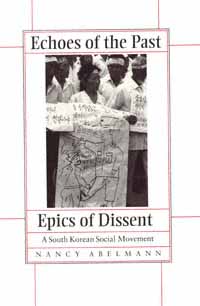 | Title: Echoes of the past, epics of dissent: a South Korean social movement Author: Abelmann, Nancy Published: University of California Press, 1996 Subjects: Anthropology | Asian Studies | Politics | Sociology | Cultural Anthropology Publisher's Description: Echoes of the Past, Epics of Dissent , the story of a South Korean social movement, offers a window to a decade of tumultuous social protest in a postcolonial, divided nation. Abelmann brings a dramatic chapter of modern Korean history to life - a period in which farmers, student activists, and organizers joined to protest the corporate ownership of tenant plots never distributed in the 1949 Land Reform.From public sites of protest to backstage meetings and negotiations, from farming villages to university campuses, Abelmann's highly original study explores this movement as a complex process always in the making. Her discussion moves fluently between past and present, local and national, elites and dominated, and urban and rural. Touching on major historical issues, this ethnography of dissent explores contemporary popular nationalism and historical consciousness. [brief] Similar Items |
| 78. |  | Title: The elusive embryo: how women and men approach new reproductive technologies Author: Becker, Gaylene Published: University of California Press, 2000 Subjects: Anthropology | Cultural Anthropology | Sociology | Gender Studies | Medical Anthropology | Medicine | Women's Studies | Science Publisher's Description: In the first book to examine the industry of reproductive technology from the perspective of the consumer, Gay Becker scrutinizes the staggering array of medical options available to women and men with fertility problems and assesses the toll - both financial and emotional - that the quest for a biological child often exacts from would-be parents. Becker interviewed hundreds of people over a period of years; their stories are presented here in their own words. Absorbing, informative, and in many cases moving, these stories address deep-seated notions about gender, self-worth, and the cultural ideal of biological parenthood. Becker moves beyond people's personal experiences to examine contemporary meanings of technology and the role of consumption in modern life. What emerges is a clear view of technology as culture, with technology the template on which issues such as gender, nature, and the body are being rewritten and continuously altered. The Elusive Embryo chronicles the history and development of reproductive technology, and shows how global forces in consumer culture have contributed to the industry's growth. Becker examines how increasing use of reproductive technology has changed ideas about "natural" pregnancy and birth. Discussing topics such as in vitro fertilization, how men and women "naturalize" the use of a donor, and what happens when new reproductive technologies don't work, Becker shows how the experience of infertility has become increasingly politicized as potential parents confront the powerful forces that shape this industry. The Elusive Embryo is accessible, well written, and well documented. It will be an invaluable resource for people using or considering new reproductive technologies as well as for social scientists and health professionals. [brief] Similar Items |
| 79. | 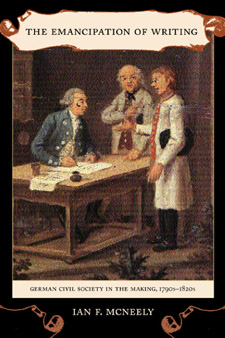 | Title: The emancipation of writing: German civil society in the making, 1790s-1820s Author: McNeely, Ian F 1971- Published: University of California Press, 2003 Subjects: History | European Studies | German Studies | European History | Sociology | Political Theory | Anthropology Publisher's Description: The Emancipation of Writing is the first study of writing in its connection to bureaucracy, citizenship, and the state in Germany. Stitching together micro- and macro-level analysis, it reconstructs the vibrant, textually saturated civic culture of the German southwest in the aftermath of the French Revolution and Napoleon's invasions. Ian F. McNeely reveals that Germany's notoriously oppressive bureaucracy, when viewed through the writing practices that were its lifeblood, could also function as a site of citizenship. Citizens, acting under the mediation of powerful local scribes, practiced their freedoms in written engagements with the state. Their communications laid the basis for civil society, showing how social networks commonly associated with the free market, the free press, and the voluntary association could also take root in powerful state institutions. [brief] Similar Items |
| 80. | 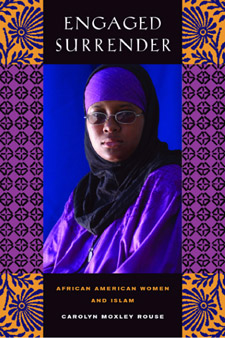 | Title: Engaged surrender: African American women and Islam Author: Rouse, Carolyn Moxley 1965- Published: University of California Press, 2004 Subjects: Anthropology | American Studies | Religion | African American Studies | Sociology Publisher's Description: Commonly portrayed in the media as holding women in strict subordination and deference to men, Islam is nonetheless attracting numerous converts among African American women. Are these women "reproducing their oppression," as it might seem? Or does their adherence to the religion suggest unsuspected subtleties and complexities in the relation of women, especially black women, to Islam? Carolyn Rouse sought answers to these questions among the women of Sunni Muslim mosques in Los Angeles. Her richly textured study provides rare insight into the meaning of Islam for African American women; in particular, Rouse shows how the teachings of Islam give these women a sense of power and control over interpretations of gender, family, authority, and obligations. In Engaged Surrender, Islam becomes a unique prism for clarifying the role of faith in contemporary black women's experience. Through these women's stories, Rouse reveals how commitment to Islam refracts complex processes - urbanization, political and social radicalization, and deindustrialization - that shape black lives generally, and black women's lives in particular. Rather than focusing on traditional (and deeply male) ideas of autonomy and supremacy, the book - and the community of women it depicts - emphasizes more holistic notions of collective obligation, personal humility, and commitment to overarching codes of conduct and belief. A much-needed corrective to media portraits of Islam and the misconceptions they engender, this engaged and engaging work offers an intimate, in-depth look into the vexed and interlocking issues of Islam, gender, and race. [brief] Similar Items |